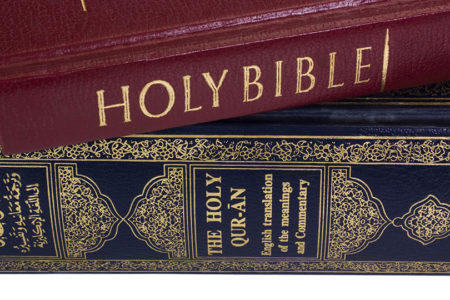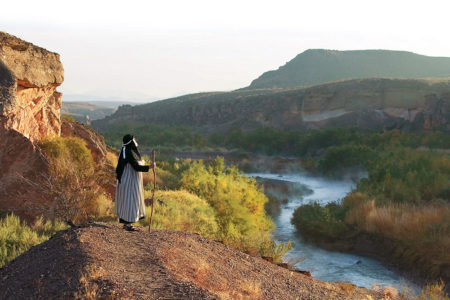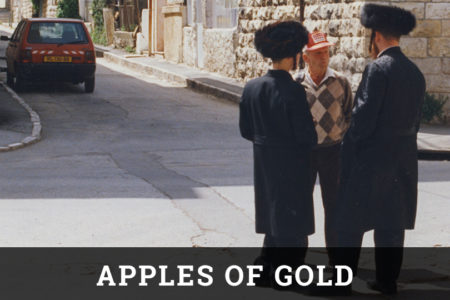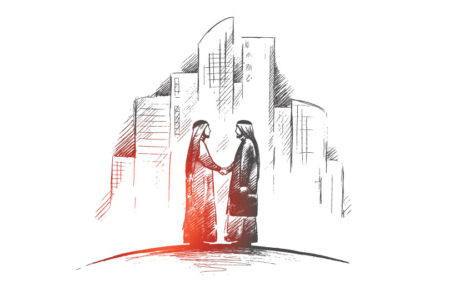The Day of the Lord Zephaniah 1:7–2:3
On June 22, 1990, a massive earthquake rocked northern Iran just after midnight. Iranian radio estimated the death toll to be approximately 45,000, with as many as 130,000 injured. Entire villages were either reduced to rubble or completely buried in less than one minute. Most North Americans are unable to comprehend that kind of devastation, having never experienced an earthquake of such magnitude.
In the July 2, 1990 issue of Time magazine, it was called “The Hour of Doom.” Newsweek, in their July 2, 1990 issue, called it “Enduring a Test of God.” Little did these bureau reporters know the prophetic overtones of their captions. A day is coming when such devastation will sweep the entire earth, a day called, in biblical terms, the Day of the Lord.
Need For Judgment (vv. 1:7–13)
Zephaniah announced that God was prepared to judge Judah. He went on to say, “Hold thy peace at the presence of the Lord Gᴏᴅ; for the day of the Lᴏʀᴅ is at hand” (v. 7). The people were to remain silent before the sovereign Lord of the universe. Pleading for mercy would not turn away His vengeance, for God’s judgment was ready to fall upon the nation.
The judgment is described as “a [His] sacrifice” for which God had already “bidden [appointed] his guests” (v. 7). Judah was to be the sacrifice, and the hated Babylonians were the guests who would slaughter the nation and devour her, like an animal sacrificed in the Temple.
Zephaniah mentioned seven groups who would suffer the judgment of God. First, the “princes” (v. 8)—those serving as judges, magistrates, and aristocrats in the king’s court—would be judged. These leaders should have been the prime example of morality, righteousness, and justice in the nation, but instead they were the main promoters of wickedness, severely oppressing the people.
Second, the king’s posterity would suffer judgment. After Josiah’s death, God would not allow his children (v. 8) to have a long or successful rule. Johoahaz’s rule lasted only three months (2 Ki. 23:31–34). King Jehoiakim ruled for 11 years (2 Ki. 23:36) but was defeated by Nebuchadnezzar (2 Ki. 24:1–2). Jehoiachin’s reign lasted only three months before he was deported to Babylon (2 Ki. 24:8–16). Judah’s last king, Zedekiah, ruled for 11 years but was eventually taken captive, blinded, and deported to Babylon (2 Ki. 24:18–25:7).
The iron-fisted rule of totalitarian despots in Eastern Europe is a prime example of such oppression in this century. These Communist leaders committed unbelievable atrocities against their people, milking their countries of their resources while they themselves lived in luxury. Judgment has fallen on many of them. In the wake of socialistic reforms, some of these leaders have been removed from office in disgrace, some have been thrown into prison, and others have been executed.
The rebellion of Judah’s leaders was seen in their dress: “such as are clothed with foreign apparel” (v. 8). Adopting such outward dress meant that the leaders had assumed the customs, habits, and manners of their godless neighbors—Egypt, Assyria, and Babylon. In other words they took on the look of worldly materialism (cp. Isa. 3:16–24). Isaiah put it well when he said, “The show of their countenance doth witness against them” (Isa. 3:9).
The Lord had set forth certain requirements regarding clothing for the Israelites (Dt. 22:11–12). The reason for not mixing wool and linen in the same garment (Dt. 22:11) is uncertain; it may have been a pagan practice from which Israel was being protected. The Israelites were commanded to put fringes (tassels) on their garments (Dt. 22:12) to serve as a reminder of the Lord’s commandments and their covenant commitment to obey them (Num. 15:37–40). In like manner, Peter reminded Christian women that their clothing is to be consistent with godliness (1 Pet. 3:3–4). Such is not the case with many Christian men and women who dress in a worldly manner.
Third, the plunderers would be judged, “those who leap on [over] the threshold, who fill their masters’ houses with violence and deceit” (v. 9). The term “Leap on the threshold” may refer to the Philistines’ superstitious practice of not stepping on a threshold (since the image of their god Dagon had fallen on the threshold in his pagan temple, 1 Sam. 5:4–5), or a quick entrance into someone else’s house for the purpose of robbery. The latter view seems more likely. Such base men were retained by their masters (political leaders in the king’s court) to acquire wealth by violent and fraudulent means.
Fourth, people in every area of Jerusalem—the “fish gate [northern section] … the second quarter [new city, northwest of the Temple], and … from the hills [the whole area of the city]” (v. 10)—would wail in agony when God’s judgment felt. There would be howling and shrieking, intermingled with the triumphant shouts of the enemy as they plundered and slew the people. In the background would be heard the crash of houses, palaces, and the Temple as they were being destroyed.
Fifth, the polluted business district would be destroyed. “For all the merchant people are cut down, all they that bear silver are cut off” (v. 11). They were located in the “Maktesh” (a mortar or hollow, v. 11), the lower section running north and south along the Temple wall known as the Tyropean Valley. In this market area Jewish merchants and money changers conducted their business.
Zephaniah called them “merchant people” (v. 11), a contemptuous phrase meaning people of Canaan and used of the unscrupulous Phoenicians who were shrewd, greedy, and dishonest in trading and usury. Apparently the Jewish merchants had become like the Canaanites in the way they conducted their business. Both the merchants and the money changers (those laden with silver, v. 11) would be cut off.
Sixth, the passionless people of Jerusalem, “the men that are settled on their lees” (v. 12), would be destroyed. The lees are dregs that must be separated from wine during its processing. If the dregs are left in the wine too long it becomes a thick, bitter syrup. Thus, to settle on one’s lees is to become hardened, spiritually complacent, and callous in character and conduct. Instead of cleansing themselves of the dregs of sin through daily repentance, the people of Judah had settled into the dregs of impurity, practicing the moral wickedness of their heathen neighbors.* Then they projected their own spiritual impurity and complacency upon the Lord by saying “The LORD will not do good, neither will he do evil” (v. 12). They had become so indifferent to God that they viewed Him in the same light as a pagan idol, having neither interest in nor the ability to intervene in the affairs of men. They had come to the point of denying God’s divine providence in the universe, as well as His power and promise to deliver from divine judgment.*
This is true today of some in the Church who profess to be Christians. They consider God to be their Savior but not their sovereign Lord. They give Him lip service from time to time but live as if God cares little about them personally and has no control over the circumstances of their lives.
The Lord will “search Jerusalem with lamps” (v. 12), seeking such people to judge. God is pictured as diligently searching every area of Jerusalem just as a person searches every corner of a darkened room. During the Roman destruction of Jerusalem in 70 A.D., the inhabitants of the city were dragged out of sewers, holes, caves, and tombs to be put to death.* Of course, we cannot forget that God uses the same diligence to seek and save those who are lost (Lk 15:8–10).
Seventh, the property of the wealthy would be destroyed: “their goods shall become a booty, and their houses a desolation” (v. 13). God would not allow them to enjoy the houses and vineyards they had obtained through ill-gotten gain (cp. Lev. 26:32–33; Dt. 28:30; Amos 5:11; Mic. 6:15). God would prove to Judah that He keeps His promises by stripping such wealthy people of their possessions.
Paul warned that Christians who seek riches fall into temptations, traps, and dangerous desires that can plunge them into ruin and destruction. In fact, those who are eager to gain wealth have actually wandered from the faith and pierced themselves with many sorrows. Paul went on to admonish believers to flee from seeking wealth and to pursue righteousness and godliness (1 Tim. 6:9–11). This is a message that every believer should heed in this age of materialism.
Nearness of Judgment (vv. 1:14–18)
Once again Zephaniah returned to his theme, this time emphasizing twice the nearness of “The great day of the Lᴏʀᴅ” (v. 14) He underscored its imminence by stating that “it is near, and hasteneth greatly [speedily] “toward its coming (v. 14). The word near is in the emphatic position to stress how quickly it will come. It is so close that the voice (sound) of its coming can be heard (v. 14).
How true were the prophet’s words. It was near for the Assyrians, who were destroyed in 612 B.C. It was near for Judah, who suffered three waves of Babylonian persecution and was finally destroyed in 586 B.C. It was near for the Babylonians, who were destroyed by the Medo-Persian Empire in 539 B.C.
The future Day of the Lord will be so awesome in its terror that “the mighty man shall cry there bitterly” (v. 14). Even battle-hardened warriors, fearing neither conflict nor man, will cry in terror like frightened children when the Lord’s judgment comes. This awesome day of God’s wrath will be a time of total destruction. A vivid description is given by Zephaniah in a series of five couplets. It will be “a day of trouble and distress … waste and desolation … darkness and gloominess … clouds and thick darkness … trumpet and alarm” (vv. 15–16).
The shrill sound of the battle trumpet mixed with the war cry of the invading hordes filled the populace with anguish and terror. Distress and death so overwhelmed the hemmed-in inhabitants of Jerusalem that they staggered through the city, dazed and helpless, “Like blind men” (v. 17; cp. Dt. 28:28–29). Jerusalem was shrouded in thick, dark smoke, blotting out the hot August sun and suffocating the people in an inferno of total destruction. The nation was completely defenseless against the surging warriors; none of the “fortified cities” or “high towers” (v. 16) stood against the army of Babylon. There was so much carnage that their blood was “poured out like dust, and their flesh like the dung” (v. 17). The invaders cruelly ravished the bodies of the dead, piling up their internal organs like the filth of dung hills.* All of this occurred because those who had “sinned against the Lᴏʀᴅ” (v. 17) had hardened themselves to the patient pleading of a loving God who tried to woo them to repentance. Now repentance was denied them, and no amount of “silver nor their gold shall be able to deliver them in the day of the Lord’s wrath” (v. 18). They could not bribe the enemy or God in order to delay the destruction.
The same is true in the spiritual realm. Man cannot be “redeemed with corruptible things, like silver and gold … But [only] with the precious blood of Christ, as of a lamb without blemish and without spot” (1 Pet. 1:18–19). What was true of Judah’s destruction will one day be true of the entire world: “the whole land [earth] shall be devoured by the fire of his [God’s] jealousy” (v. 18). When God’s judgment falls, it will bring “a speedy riddance [complete end] of all those who dwell in the land” (v. 18).
National Judgment (vv. 2:1–3)
Zephaniah pled with Judah to regather before judgment came. “Gather yourselves together, yea, gather together, O nation not desired” (2:1). By repeating the phrase, the prophet emphasized the urgent need for Judah to collectively cry out to God in repentance. The verb gather portrays a beggar stooping low to glean stubble from a field after the main harvest. The word nation is used of Gentiles who do not know God. The phrase not desired refers to people white (pale) with shame, not even blushing before God. The people of Judah are pictured as worthless, like Gentiles who have no knowledge of God or shame for their sin, ready to be destroyed by fire.
There was no time for delay; judgment was coming. Thus, Zephaniah issued a final call to the nation to repent, introducing each phrase with the word before. Repent “Before the decree bring forth, before the day pass like the chaff” (v. 2). The appointed Day of the Lord had been decreed, and God could bring it to pass as swiftly as chaff is blown away by the wind. Repent “before the fierce anger of the Lᴏʀᴅ come upon you, before the day of the Lᴏʀᴅ’s anger come upon you” (v. 2); that is, before the burning anger of God’s wrath is poured out in all its fury.
There was within Judah a remnant of people who had remained faithful in their commitment to the Lord. The prophet admonished them to continually “Seek the Lᴏʀᴅ, … seek righteousness, seek meekness” (v. 3). If the faithful remnant continued in righteousness, “it may be [they] shall be hidden in the day of the Lᴏʀᴅ’s anger” (v. 3).
A remnant was hidden (sheltered) from the Day of the Lord’s wrath. Many were sent to Babylon in captivity, while “the poorest sort of the people” were permitted to remain in Judah (2 Ki. 24:14–16). Once again God’s grace and mercy were manifested in the midst of judgment. Such will be the case during the Great Tribulation when the Lord will protect a godly remnant of Jewish believers from the final Day of the Lord (Rev. 7:3–8; 12:13–17).
Although the phrase Day of the Lord refers to the local judgment God brought on Judah (vv. 1:7, 14; 2:3) and her neighboring nations (vv. 2:4–15), it also speaks of a future day when God will intervene in the affairs of this world. The Day of the Lord can be described as the direct intervention of God in the affairs of man after the Rapture of the Church, covering such events as the Tribulation (rev. 6–19), the Millennial Kingdom (Rev. 20:2–6), and the Great White Throne Judgment (Rev. 20:11–15). It is clear from Scripture that this day will not only be a time when God will pour out His wrath upon the wicked, but will also include a time of blessing for Israel and the Church during the millennial reign of Christ on the earth. Peter wrote, “But the day of the Lord will come as a thief in the night, in which the heavens shall pass away with a great noise, and the elements shall melt with fervent heat; the earth also” (2 Pet. 3:10). Because these events will take place after the Millennium, the Day of the Lord will include a time of blessing as well.
The Time magazine reporter may have been right, “The Hour of Doom” may be very near. World events indicate that the Rapture of the Church could be near, and the Day of the Lord may soon appear.
At a time such as this, no better warning than Paul’s can be given: “Knowing, therefore, the terror of the Lord, we persuade men” (2 Cor. 5:11). We must persuade men that there is a judgment coming on this earth. We must persuade men that they will appear before Christ as their judge. We must persuade men of their need to be reconciled to God through Jesus Christ in light of the coming Day of the Lord.






